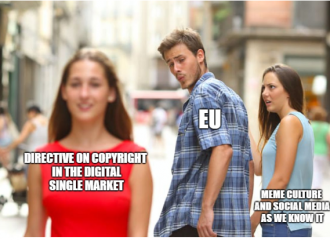2018 came and went in a flash. France celebrated glory in the FIFA World Cup in Russia; Banksy sold his ‘Girl With Balloon’ painting for $1.86 million before the artwork shredded itself seconds after the gavel dropped; and the online world was captivated by the World Record Egg. And as we say goodbye to summer and settle into the working year, why not take the chance to reminisce on some of the more important developments of 2018, and look forward to those that 2019 has in store?

Looking back on 2018
- New obligations were enforced under the European Union General Data Protection Regulation (the GDPR). While the GDPR is an EU regulation, the obligations have a wide reach, applying to all Australian businesses who have an establishment in the EU, offer goods & services to the EU, or monitor the behaviour of individuals in the EU.
- As part of the government’s safe harbour and insolvency reforms, we saw the introduction of the ipso facto insolvency reforms by way of the Treasury Laws Amendment (2017 Enterprise Incentives No.2) Act 2017. The reforms apply to contracts entered into on or after 1 July 2018, affecting the ability of contracting parties to exercise termination, enforcement or other rights that are triggered by a company restructuring or insolvency.
- The European Parliament voted in favour of introducing the controversial EU Copyright Directive, a legislation designed to better meet the needs of copyright protection in the internet age. The proposed directive caused significant global debate around the detrimental effects of Articles 11 (the Link Tax) and 13 (the Meme Ban), headlined as the ‘death of the Internet’.
- The ACCC highlighted its hard stance against franchises attempting to contract out of their obligations under the Franchising Code of Conduct and the Competition and Consumer Act. The ACCC’s case against Husqvarna Australia highlighted the importance of all companies that appoint dealers, distributors, licensees or similar, to confirm whether their contracts are in fact franchise agreements.
- A Victorian Supreme Court cast some doubt over the enforceability of contractual provisions that attempt to limit the period in which parties can claim for misleading or deceptive conduct. This arose in the case of Brighton Australia Pty Ltd v Multiplex Constructions Pty Ltd [2018] VSC 246, where the court considered the enforceability of a contractual provision requiring claims (including for misleading or deceptive conduct) to be made within 7 days.Justice Riordan, deciding in contradiction to a number of NSW decisions, ruled in favour of the “no exclusion principle”, stating that allowing the enforceability of such time limitations on claims would be against the public policy underpinning the provisions of the Australian Consumer Law (ACL).
Some areas to watch in 2019
- Discussions over the EU Copyright Directive continue, with negotiators for the European Parliament aiming to finalise the directive shortly. However, negotiations have broken down, with the three-way discussion between Council, Parliament and member states derailed over the exact wording over Article 11 and Article 13. Consequently, the “trialogue” discussion that was set to take place on 23 January was cancelled. With upcoming EU elections in May, there likelihood of any closure on this matter in the near future is low, with a final vote likely to take place under the next parliament.
- The Telecommunications and Other Legislation Amendment (Assistance and Access) Act 2018, commonly referred to as the AA Bill, was passed in December of last year. The Bill’s aim is to compel various companies, especially those in communications industries, to assist Australian security and law enforcement agencies by allowing access to encrypted communications they believe may contain plans for illegal or terrorist activity. The implications of the Bill will be an interesting area to watch throughout the year, with a number of people, especially those within the tech and start-up communities expressing their concerns.
- On 10 December 2018, the ACCC released its Digital Platforms Inquiry Preliminary Report. The ACCC’s report is founded on questioning the role and accountability of the global digital platforms (such as Facebook and Google) in the supply of advertising, news and journalism in Australia. The final report addressing these issues will be due on 3 June of this year.
- There has been some debate globally and in Australia regarding the “hipster antitrust” laws, questioning the standards of competition law. The current foundation of competition law in Australia is focused on consumer welfare. However, concerns have been raised that this standard is too narrow and does not allow for prosecution of some types of conduct that some commentators believe competition law should cover.While this debate is likely to continue throughout the year, ACCC Chairman Rod Sims has reinforced Australia’s consumer welfare position, expressing their opposition to the introduction of broader interest considerations of public policy into competition law enforcement.
Author: Blake Motbey, Paralegal.




